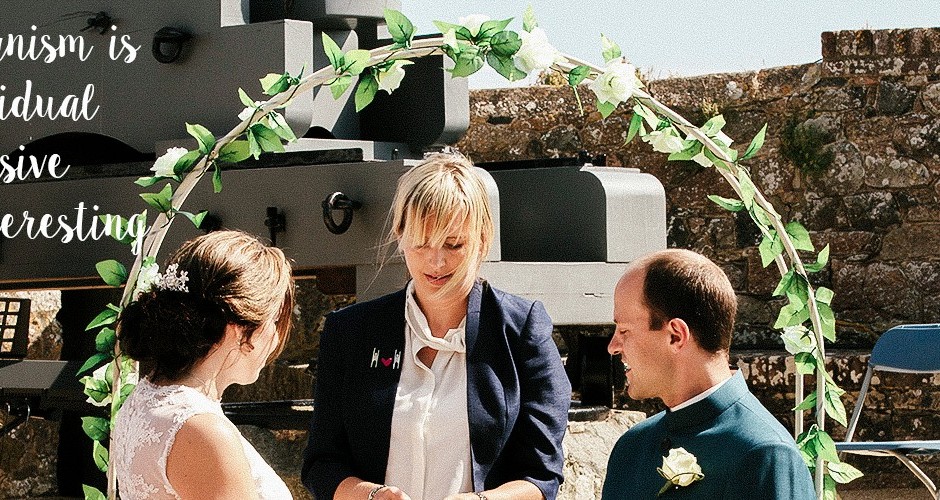Legalising it
Is a humanist wedding legal?
Humanist marriage gained legal recognition in Scotland in 2005 and the Republic of Ireland in 2012. Earlier this year, in June 2017, a humanist couple, spokesperson/model, Laura LaCole and pro footballer, Eunan O’Kane, won their right to have a legal humanist wedding ceremony in Northern Ireland.
They had the first humanist wedding with legal recognition in the United Kingdom in June.
However, the Attorney General appealed and we are still waiting for the outcome of a further hearing.
Scottish Humanist Weddings
With Scotland celebrating its 50,000th legal humanist wedding since 2005 this summer, it can feel like the rest of the UK is still in the dark ages. Humanists UK have been campaigning for the legal recognition of humanist marriage on the grounds of equality; it should be the equal right for non-religious people to have legal humanist wedding ceremonies.
In Scotland, humanist weddings are like Jewish weddings, in that they can be held anywhere. Jewish weddings do not need a licensed venue, just a Rabbi. In the same way, a humanist wedding ceremony would simply need an accredited humanist celebrant. This is important as by choosing a Humanist Ceremonies accredited celebrant, it means that if the marriage laws are brought up to date to allow legal humanist weddings, then your celebrant may be able to do the legal part (which currently has to be done by a registrar).
The legal part is simply a couple of standardised sentences, so these could be easily slipped into your unique, personalised humanist ceremony.
It’s also worth knowing that we Humanist Ceremonies celebrants have an arrangement with Scotland so we can go to Scotland and conduct legal humanist wedding ceremonies there. If you are interested in having your wedding in Scotland and you are looking for a humanist celebrant, please get in touch. Most of us celebrants are happy to travel to the Highlands to conduct a legal humanist wedding!
Do we need to go to a registrar?
In the UK, at the time of writing, you will need to go to the registrar for the ‘legal bit’. However, you can save the ring exchange, the meaningful words, the promises, the readings and all the parts that make your unique, memorable wedding ceremony, for your humanist wedding ceremony. You can go to the registrar a few days or weeks before your wedding day, or afterwards. So, that flexibility means you can choose the cheapest midweek option at the registrar.
What’s the difference between a registar’s wedding ceremony and a humanist one?
A humanist celebrant will take time to get to know you, to collaborate creatively, and research and write a personalised ceremony for you. A registar will probably use the same script with gap fills for your name.
Unlike a registrar, who may do several ceremonies in one day, a humanist celebrant will tend to only take one wedding ceremony on one day so it is not rushed. In fact, many couples prefer the fact that there is nothing rushed about a humanist ceremony, although they can be as long or as short as you decide.
I have worked with a registrar in the past, who came to the wedding ceremony. We had a break of music to clearly define the difference between her legal part (which was only a few minutes’ long) and the humanist ceremony. The registrar was really easy to work with, as we were both focussed on the couple themselves, and what the couple wanted. Family and friends all really enjoyed the humanist ceremony; without which, it would have not felt as meaningful.
Personally, as a humanist celebrant and free thinker, I dream of the day that we gain legal recognition for humanist marriage and a time when it will be extraordinary to think that this human right was ever denied to humanist or non-religious people.
Same sex marriage laws have finally been changed, so now it’s time to consider non-religious and humanist people too.
(NB These are all my own views/opinions)


